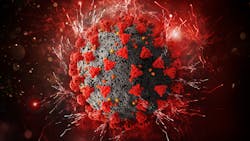Recent studies have shown that patients with weakened immune systems—which enables the virus that causes COVID-19 to remain longer in the body, copy itself, and continually change—may enable the development of new, slightly different versions of the virus (variants). These people include those treated with drugs that suppress the immune system to keep it from rejecting a newly transplanted organ.
A new study led by researchers at NYU Grossman School of Medicine and NYU Long Island School of Medicine shows that two people with kidney transplants who were treated with immunosuppressive drugs, and who later had a lengthy COVID-19 infection, developed a version of the virus with a genetic change (mutation) that made it resistant to the antiviral therapy remdesivir.
This treatment is among the first antiviral drugs approved for use in the pandemic and remains an important weapon against the pandemic coronavirus. Remdesivir is especially important for people who have received transplants since the more recently developed Paxlovid, a combination of nirmatrelvir and ritonavir, can interfere with immunosuppressants sometimes used for these patients, say the study authors.
The study results reflect a standard problem in antiviral medicine, in which the rapid and error-prone reproductive process of viruses continuously creates slightly different genetic versions of themselves. Some randomly develop the qualities needed to resist the drug treatment. In the case of SARS-CoV-2, the pandemic virus, remdesivir is thought to work by interfering with the virus’s ability to create copies of itself through the action of a polymerase, a viral enzyme.
According to the findings, both people were initially infected with a version of the coronavirus that did not carry the mutation that provides resistance to remdesivir. However, following treatment with the antiviral agent, the virus developed the V7921 RNA-dependent polymerase (V7921) gene mutation, which has previously been shown in laboratory settings to make the virus more resistant to remdesivir.
Despite the availability of vaccines and several drug therapies for COVID-19, experts say people with compromised immune systems, such as transplant patients and those with cancer or untreated HIV, remain at high risk for the disease. The new study, published online September 26 in the journal Clinical Infectious Diseases, is the first to identify the remdesivir-resistant V7921 mutation in people with organ transplants treated with the antiviral drug, according to Dr. Hogan.
For the investigation, which was funded by NYU Langone, the study team collected samples from the nostrils of the two people, one in their 50s and the other in their 60s, who had each received a kidney transplant and were using immunosuppressant drugs. Despite being vaccinated against COVID-19 before the surgery, both developed symptoms of the disease, such as fatigue, cough, and fever, that lingered for months.
The study team examined the genetic makeup of the viral samples at NYU Langone’s Genome Technology Center by comparing small snips of the genetic code to identify mutations found in each strain. These genetic flags, researchers say, offer results similar to those from tests used to trace people’s ancestry and for the tracking of other viral outbreaks, including influenza, HIV, and Ebola.
According to the report, both people were treated for COVID-19 with remdesivir but were readmitted to the hospital several weeks later as their symptoms worsened once again. They survived their illnesses.
However, when the researchers reanalyzed the viruses, they confirmed the presence of the V7921 mutation, which had not been present before the transplant recipients received their remdesivir treatment.

